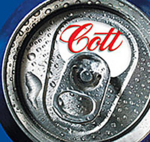
The international company did not inform 49-year-old contractor, Richard Sharp, that ozone would be present in the plant room when he arrived to service an ultra violet light system on July 26 2010.
Sharp was overcome by fumes from ozone gas and began to feel breathless. He left the room to take a break, then returned to continue working.
However, his condition worsened and he eventually contacted a doctor, who sent him to hospital for treatment in the poisons unit.
He was diagnosed with acute irritant asthma, which had been contracted as a result of his exposure at the factory.
Sharp said: “My life is now very restricted. I can no longer carry out normal activities such as taking the dog for a walk or wandering to the pub without worrying about what is around the corner – from a garden fire to chimney smoke to car fumes. They could all start the asthma. I struggle to go to people’s houses as things like air fresheners, candles, strong perfumes and deodorants can all trigger an attack.
‘Prisoner in my own home’
“My entire way of life has had to change. I feel like a prisoner in my own home.”
The Health and Safety Executive (HSE) investigated the incident and Cott Beverages pleaded guilty to breaching Section 2 and 3 of the Health and Safety at Work Act of 1974.
It was fined £20,000 and ordered to pay £11,565 in costs.
The HSE said the company failed to carry out a suitable and sufficient assessment of the risks arising from the ozone generating equipment. It had also failed to implement a safe system of work for servicing the equipment and associated alarms.
In addition, people on site were not adequately trained or supervised to safely issue work permits to the ozone room, and the company failed to implement a system to monitor and review the effectiveness of the permit to work system.
After the hearing, HSE inspector Richenda Dixon said: “Cott Beverages was aware of the hazards of ozone and knew there was a leak, but had done nothing to fix the problem or protect its employees or contractors from coming into contact with this gas.
‘Severely affected’
“As a result of the company’s failings, Richard’s quality of life has been severely affected and it is unlikely he will be able to return to his normal job.
“The company should have foreseen the risks and devised a safe way of working.”
Sharp said: “My career has ended. I had a secure enjoyable job and am now unable to return due to the acute ozone induced irritant asthma. I don’t have daily contact with people and find it hard to face each day.”





